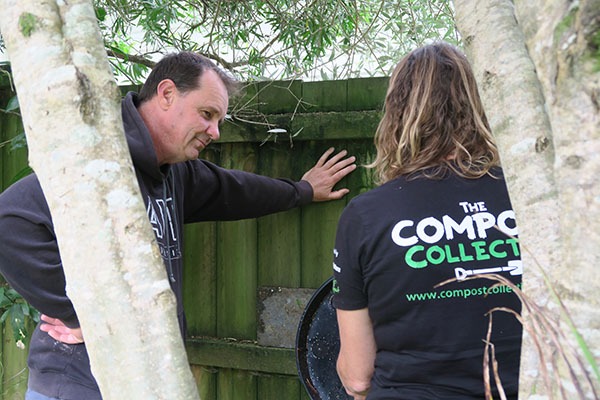Andrew – Kaipātiki
Tell us a bit about yourself.
I’m Andrew, and I’ve been a member of the Kaipātiki Local Board for a year now, which has been a fun and steep learning curve for me. My background and career is social work, mainly in adult mental health and wellbeing.
What composting methods do you use and how did you get started?
I have a worm farm and a traditional composting bin for garden waste. I’ve always had a compost of some type, for dealing with garden waste and kitchen waste. My family did also, as I was growing up, and I’ve also gardened for a long time.
When did you start your worm farm?
I started the worm farm after I had some issues with rats in my compost bin, which at the time was dealing with both garden and kitchen waste. Pest Free Kaipātiki helped me deal with the rats and at the same time, I set up the worm farm, to separate the kitchen waste out. Worm farms are more enclosed and therefore more controlled. While I’ve had the worm farm for about 18 months, it’s only in the last year I’ve really started to give it proper attention.
By this, I mean noting down the weight of the food scraps I’m putting in there. In fact, since 1 January 2020 to 31 December 2020, I’ve put 101.6kgs of kitchen waste into the worm farm. I think that’s pretty cool!
My next bit of science will be to calculate how much product this has made in terms of worm tailings (castings) and worm wee. I’m also wondering if this is taking carbon out of the atmosphere, and is this a carbon sequestration activity that is happening here.
Does composting take a lot of time in your day?
Not really. I put stuff in there once a week and that’s a five minute job. If you sort at the start of the process, as you are making food, it’s just thinking about what will go in the worm farm waste and what will go into the kerbside rubbish. So for example, avocado pips go into the rubbish because the worms won’t eat those, but the avocado skins can go in the worm farm. I have noticed that it’s good to cut the avocado skins up first, because otherwise they don’t get eaten as quickly.
Have you faced any challenges with your worm farm?
Asking the kids to empty the food scraps into the worm farm! Sometimes it’s just easier to do that yourself.
What’s the main benefit for you and your family from composting?
Well, I’ve done the maths because it costs to put rubbish out at the kerb for collection. With 101.6kg of food scraps going into the worm farm, that equates to 10 prepaid rubbish bags that I haven’t had to pay for, and I’ve got fertiliser to nourish my garden as well.
What do you think stops people from starting composting and how can we encourage people to start?
If you are talking about worm farms, it’s probably the ‘ick factor’. Yes, it’s a bit icky but if you get over that, then there’s no stopping you! I think it’s about more education that we need to make less waste generally. Kitchen waste is actually a resource and can go back to nourish the garden, just like our recycling system – it’s a resource that’s part of a circular economy.
Why do you think it’s so important to keep the soil healthy, as part of a healthy community?
Gardening is something I’ve always done, which means looking after the soil, growing food and having your hands in the dirt. I’ve worked in the adult mental health sector for a long time and as a social worker. This role has been stressful at times but I do enjoy working with people.
Coming home from work and getting into the garden and getting in touch with the soil, even just to be outdoors is good for me and I’m sure it’s good for lots of people. Kelmarna Gardens in Grey Lynn is a great example of a community project, where the gardens are tended by people with mental health issues. I think it’s been a great way to get people involved in growing their own food and working with the soil. Lots of research suggests the outdoors and being outside in the garden is good for your mental health.
Want to get your own worm farm started?
Find an online step-by-step guide to setting up a worm farm here or find a free workshop happening near you here.